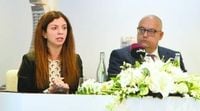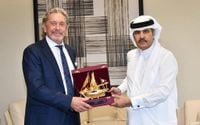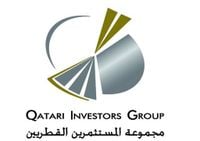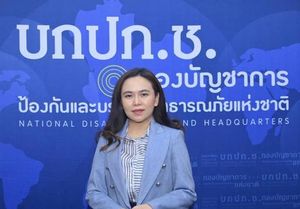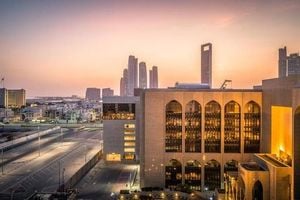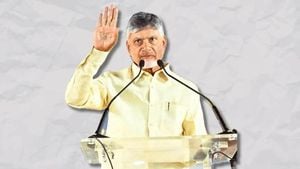In a significant move to enhance trade relations, representatives from Qatar and Australia met on April 21, 2025, to discuss the establishment of a business council aimed at boosting mutual trade and investment. The meeting took place at the Qatar Chamber’s headquarters in Doha, where Rashid bin Hamad Al-Athba, the Second Vice Chairman of the Qatar Chamber, hosted Lyall Gorman, the Vice President of the Australian Chamber of Commerce and Industry.
During the meeting, Al-Athba highlighted the growing interest among Qatari businessmen in exploring investment opportunities in Australia. "He emphasised the importance of continued collaboration with the Australian Chamber to bring the business communities of both countries closer," the Qatar Chamber stated in a release. This collaboration is not new; the two chambers had previously signed an agreement in 2024 aimed at facilitating better coordination through the exchange of information related to business, trade, and investment.
Gorman, during the discussions, encouraged Qatari investors to consider the potential investment opportunities in Australia. He expressed a strong interest in establishing a Qatari-Australian Business Council, which would further promote trade exchanges between the two nations. "He affirmed the Australian Chamber’s commitment to activating the cooperation agreement," the statement from the Qatar Chamber read.
Ali Saeed Bu Sharbak Al-Mansori, the Acting Director General of the Qatar Chamber, also attended the meeting and underscored the necessity of increasing mutual business visits. He noted that the Qatari private sector is particularly keen on learning about investment prospects in various sectors, including tourism, digital transformation, and services.
A major development in the bilateral relations between Qatar and Australia occurred earlier this year when Qatar Airways' acquisition of a 25 percent stake in Virgin Australia was approved in February 2025. This approval came from Treasurer Jim Chalmer and the Australian Foreign Investment Review Board, following earlier clearance from the Australian Competition and Consumer Commission (ACCC).
On a broader economic scale, the demand for high-quality issuers like Qatar remains robust, even amid fluctuating oil prices and global economic uncertainties. Carla Slim, an economist at Standard Chartered Bank's Middle East and North Africa (Mena) division, stated during a media roundtable on April 22, 2025, that the Middle East is uniquely positioned to withstand economic challenges, including expected stagflation in the US and disinflation in Asia.
According to Slim, there is a "very high demand for good quality paper and highly rated economies and issuers like Qatar," as investors seek to deploy their liquidity in high-quality markets. The North Field project, which aims to significantly increase Qatar's gas contributions to the economy, is expected to rebalance various macroeconomic indicators, from GDP composition to public debt ratios.
Despite experiencing an economic slowdown after the 2022 FIFA World Cup, Slim noted that Qatar has not seen a year-on-year retardation, indicating that its non-oil sectors continue to grow, albeit at a slower pace. A global research report from Standard Chartered last year forecasted that Qatar’s economy could double in size by 2031, bolstered by its ability to restore government revenues to levels seen before the 2014 oil price shock.
Furthermore, Slim indicated that Qatar has already signed long-term contracts for the expanded capacity of the North Field gas project, which is set to come online by the end of 2025. This expansion has been partially supported by the European Union's official endorsement of gas as a transition fuel.
While other regional players in the hydrocarbons sector have scaled back their expansion plans due to OPEC agreements, Qatar, alongside the UAE and Oman, maintains a comfortable fiscal position. Slim pointed out that at a Brent oil price of around $65 per barrel, these three Gulf Cooperation Council (GCC) countries still have balanced budgets or small surpluses, benefiting from a surplus of liquidity.
Moreover, Slim emphasized that the indirect impacts of oil price fluctuations and forex risks could be more significant than direct effects from the US tariff crisis. However, she remains optimistic that this environment presents opportunities for trade rerouting and deeper South-South integration, which could enhance the GCC’s standing as a global trade corridor.
As the region braces for potential stagflation from the US and disinflation from Asia, Slim reiterated that the Middle East is in a unique position to weather these economic storms. She noted that the US already enjoys a trade surplus with many Middle Eastern economies, which could mitigate the impacts of any tariff crises.
Overall, the discussions between Qatar and Australia reflect a growing commitment to strengthening economic ties, with both nations eager to explore new avenues for investment and trade. The establishment of a Qatari-Australian Business Council could serve as a crucial step in fostering closer collaboration and enhancing mutual economic benefits.
